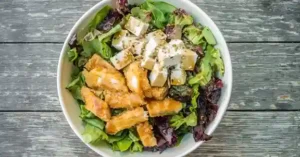Looking for a light yet satisfying meal? A low calorie chicken salad is the perfect answer. It’s creamy, refreshing, and packed with protein without the extra calories. With a few smart ingredient swaps, you can enjoy all the flavor of classic chicken salad in a healthier way. This recipe is easy to make, versatile, and great for meal prep. Keep reading to discover the key ingredients, step-by-step instructions, and tips to make the best low calorie chicken salad.

Why Choose a Chicken Salad Low Calorie Recipe
Chicken salad is a timeless dish, but traditional versions are often loaded with mayonnaise and high-fat add-ins that push up the calorie count. A low calorie chicken salad offers the same creamy texture and savory taste, but with lighter ingredients that are better for your health. By making a few simple swaps—like using Greek yogurt instead of heavy mayo—you cut unnecessary fats while keeping the dish rich in protein.
Choosing a low calorie version doesn’t mean sacrificing flavor. Fresh herbs, crunchy vegetables, and lean chicken breast add layers of taste and texture that make every bite enjoyable. This approach also makes the recipe more versatile—you can serve it in lettuce wraps, whole-grain sandwiches, or even on its own as a light meal.

Key Ingredients for a Healthy Chicken Salad
The secret to a delicious chicken salad that’s also low in calories lies in the ingredients you choose. By focusing on lean proteins, light dressings, and fresh add-ins, you can enjoy a satisfying meal without the extra calories. Here are the essentials:
Chicken Breast
Opt for skinless, boneless chicken breast. It’s naturally lean, high in protein, and keeps the salad filling without adding unnecessary fat. You can poach, bake, or grill it—just avoid frying to keep calories low.
Light Dressing Base
Traditional mayo is calorie-dense, so replace it with healthier alternatives like plain Greek yogurt or a blend of yogurt and a small amount of light mayo. This keeps the creaminess while cutting down on fat. A squeeze of lemon juice or a splash of apple cider vinegar adds brightness without calories.
Fresh Vegetables
Crunchy vegetables bring texture, volume, and nutrients without adding many calories. Good options include celery, cucumbers, red onion, bell peppers, or shredded carrots.
Herbs and Seasonings
Fresh herbs such as parsley, dill, or cilantro give the salad vibrant flavor without the need for extra dressings. A little garlic powder, paprika, salt, and pepper can enhance taste while keeping it light.
Optional Add-Ins
For a bit of variety, you can add diced apples, grapes, or even a sprinkle of nuts. Just keep portions small so the salad stays low calorie. These add a touch of sweetness or crunch without overwhelming the dis.

Step-by-Step Guide to Making Chicken Salad
Making a low calorie chicken salad is simple, but the right steps ensure it turns out moist, flavorful, and perfectly balanced. Here’s how to put it together:
Cook the Chicken
- Poaching method (recommended): Place chicken breasts in a pot of water or low-sodium broth. Add a pinch of salt, pepper, and maybe a bay leaf or garlic clove for flavor. Simmer gently until the chicken is fully cooked and tender.
- Alternative methods: Baking or grilling also works well. Just avoid frying, which adds unnecessary calories.
Shred or Dice the Chicken
Once cooled, shred the chicken with two forks or dice it into small bite-sized cubes. Shredded chicken blends well with creamy dressings, while diced pieces give more texture—choose based on your preference.
Prepare the Dressing
In a mixing bowl, combine plain Greek yogurt (or a mix of Greek yogurt and light mayo) with lemon juice, a dash of mustard, salt, and pepper. Whisk until smooth. This forms the creamy base without the heaviness of traditional mayonnaise.
Add Vegetables and Herbs
Fold in chopped celery, red onion, bell peppers, or any fresh veggies of your choice. Add herbs like parsley or dill for extra freshness. These not only boost flavor but also increase the nutritional value without adding many calories.
Combine Everything
Add the shredded or diced chicken to the bowl of dressing and vegetables. Mix gently until every piece is coated evenly. Adjust seasoning to taste.
Chill Before Serving
For the best flavor, refrigerate the salad for at least 30 minutes before serving. This allows the dressing to soak into the chicken and vegetables, making the salad creamier and more flavorful.

Tips for Keeping It Moist and Flavorful
One common issue with chicken salad is that it can turn out dry or bland if not prepared carefully. A few simple strategies can help you lock in moisture and boost flavor without piling on extra calories.
Cook the Chicken Gently
Overcooked chicken dries out quickly. Poaching in simmering water or broth is the best method because it keeps the meat tender and juicy. If baking, cover the chicken with foil to trap moisture.
Shred Instead of Cube
Shredded chicken absorbs dressing more evenly, which makes every bite creamy. Cubes can work too, but shredding ensures the salad doesn’t feel dry.
Use Greek Yogurt Smartly
Greek yogurt keeps the salad light, but it can be tangy. To balance it out, mix a small spoonful of light mayo or add lemon juice for brightness. This creates a creamy texture without excess calories.
Add Crunchy, Water-Rich Veggies
Celery, cucumbers, and bell peppers add natural moisture and a refreshing crunch. They help balance out the creaminess while keeping the salad light and fresh.
Season Well
Don’t skip seasonings. A little garlic powder, paprika, or mustard enhances flavor without adding calories. Fresh herbs like dill or parsley also make a huge difference.
Chill Before Serving
Letting the salad rest in the fridge for at least 30 minutes allows the flavors to meld and the chicken to absorb the dressing. This simple step improves both taste and texture.

Variations and Substitutions
One of the best things about chicken salad is how easily it can be customized. A low calorie chicken salad doesn’t have to be the same every time—you can swap ingredients, change the flavor profile, or add nutritious extras without losing the “light” factor. Here are some ideas:
Greek Yogurt Chicken Salad
Replace all or most of the mayo with nonfat Greek yogurt. This keeps the salad creamy, adds protein, and lowers fat. A squeeze of lemon juice balances the tang.
Avocado Chicken Salad
Mash ripe avocado into the dressing for a creamy, nutrient-rich twist. Use half avocado and half Greek yogurt to keep calories in check.
Fruity Add-Ins
Add diced apples, grapes, or dried cranberries for natural sweetness. Stick to small portions to avoid extra sugar and calories while enjoying bursts of flavor.
Crunchy Swaps
Instead of just celery, mix in cucumbers, shredded carrots, or even chopped cabbage for extra crunch without added fat.
Spiced-Up Version
Stir in a little curry powder, chili flakes, or smoked paprika to give your chicken salad a bold kick without calorie-heavy sauces.
Protein Options
While chicken breast is the leanest choice, you can substitute with leftover rotisserie chicken (skin removed), canned chicken, or even turkey breast. These options make the recipe more convenient.
Dressing Alternatives
If you’re avoiding dairy, try a light vinaigrette made with olive oil, lemon juice, and Dijon mustard. It’s refreshing and calorie-friendly in small amounts.

Serving Suggestions
A low calorie chicken salad is versatile, which makes it perfect for different meals and occasions. The way you serve it can change it from a light snack to a filling lunch or even a dinner option. Here are some creative and healthy ways to enjoy it:
Lettuce Wraps
Spoon the chicken salad into crisp lettuce leaves, such as romaine, iceberg, or butter lettuce. This keeps the meal light, refreshing, and carb-friendly.
Whole-Grain Bread or Wraps
For a more filling option, serve it on whole-grain bread, pita pockets, or whole-wheat wraps. These add fiber and keep you full longer without too many extra calories.
On Top of a Green Salad
Use the chicken salad as a protein-rich topping for mixed greens. Add cherry tomatoes, cucumbers, and a squeeze of lemon for a fresh, nutrient-packed meal.
With Crackers or Veggie Sticks
Pair small portions with whole-grain crackers, cucumber slices, or carrot sticks for a quick, satisfying snack.
Stuffed Vegetables
Hollow out tomatoes, bell peppers, or avocados and fill them with chicken salad. This makes for a colorful, fun, and nutrient-rich serving idea.
As a High-Protein Bowl
Combine chicken salad with quinoa, brown rice, or roasted veggies for a balanced and hearty meal while still keeping calories under control.

Nutrition Breakdown
One of the main reasons to make a low calorie chicken salad is to enjoy a meal that’s both light and nourishing. While exact values depend on the ingredients and portions you use, here’s a general idea of what you can expect from a healthy serving (about 1 cup made with chicken breast, Greek yogurt, and fresh vegetables):
Calories: Around 200–250 per serving
This is significantly lighter than traditional chicken salad, which can easily climb to 400–500 calories per serving when made with full-fat mayonnaise.
Protein: 25–30 grams
Chicken breast is lean and protein-rich, making this dish filling and supportive of muscle health.
Fat: 6–10 grams
Using Greek yogurt or light mayo keeps the fat content lower while still offering creaminess. Healthy add-ins like avocado or nuts may increase fat slightly but add beneficial nutrients.
Carbohydrates: 5–10 grams
Most of the carbs come from vegetables and optional fruit add-ins, which also supply fiber and natural sweetness.
Fiber: 2–4 grams
Fresh veggies like celery, cucumbers, or bell peppers provide crunch and fiber to aid digestion.
Vitamins and Minerals:
Vitamin C from bell peppers, lemon juice, or added fruit. Calcium and probiotics from Greek yogurt. Iron and potassium from chicken and vegetables.

Storage and Make-Ahead Tips
A low calorie chicken salad is not only tasty but also a great recipe to prepare ahead of time. With the right storage methods, you can keep it fresh and safe to eat for several days.
Refrigeration
Store chicken salad in an airtight container in the refrigerator. It stays fresh for 3 to 4 days when properly stored. Always keep it chilled—don’t leave it out at room temperature for more than 2 hours, as dairy-based dressings can spoil quickly.
Keep Dressing Separate (Optional)
If you’re meal prepping, consider storing the chicken and chopped veggies separately from the dressing. Combine them right before eating for maximum freshness and crunch.
Portion for Convenience
Divide the salad into single-serve containers or jars. This makes it easy to grab and go for work lunches or snacks without over-serving.
Freezing?
Chicken salad with a yogurt or mayo base doesn’t freeze well—the dressing separates and turns watery after thawing. If you want to freeze, store just the cooked chicken in freezer bags and prepare the salad fresh when needed.
Reviving Leftovers
If the salad seems a bit dry after sitting in the fridge, stir in a spoonful of Greek yogurt, a squeeze of lemon juice, or a splash of vinegar to freshen it up.

Conclusion
A low calorie chicken salad is proof that healthy eating doesn’t have to be bland or complicated. With lean chicken, light dressings, and fresh ingredients, you can enjoy a meal that’s creamy, flavorful, and satisfying without the extra calories. Whether you serve it in lettuce wraps, on whole-grain bread, or as a fresh salad topper, it’s versatile enough for any occasion. Try this recipe once, and it may quickly become your go-to option for a balanced, protein-packed meal that supports your health goals while still delivering comfort and taste.
FAQS

Chicken Salad Low Calorie Recipe
Ingredients
Method
- Cut the chicken into very small cubes and roughly chop even smaller, if using rotisserie chicken or chicken breasts.
- Add the chicken and remaining ingredients to a large bowl. Mix with a spatula until the mayo/yogurt/spices are evenly distributed.
- Refrigerate until ready to eat.
